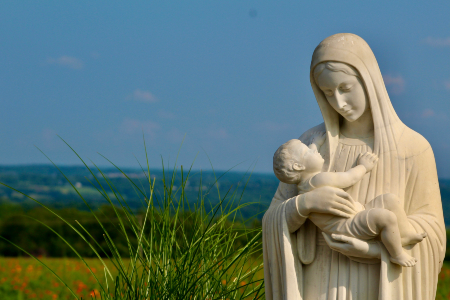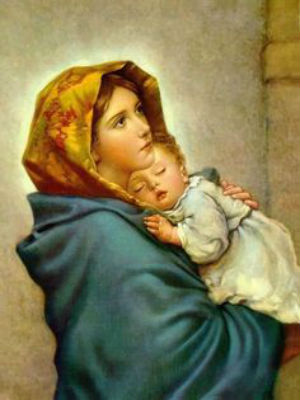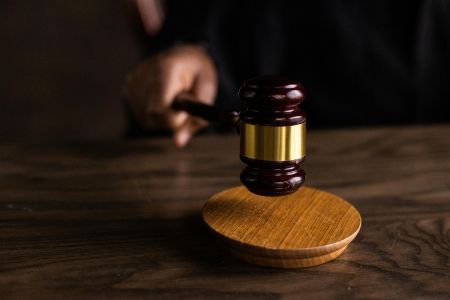We ask you, humbly: don't scroll away.
Hi readers, it seems you use Catholic Online a lot; that's great! It's a little awkward to ask, but we need your help. If you have already donated, we sincerely thank you. We're not salespeople, but we depend on donations averaging $14.76 and fewer than 1% of readers give. If you donate just $5.00, the price of your coffee, Catholic Online School could keep thriving. Thank you.Help Now >
Sandro Magister Interviews Archbishop Designate of Philadelphia Charles J. Chaput
FREE Catholic Classes
I'm coming from a little diocese a long way from Rome. I can't imagine the burdens carried by this or any other man in the Chair of Peter. I do know that Benedict XVI is a great pastor and a great disciple of Jesus Christ; a man who knows the meaning of suffering and who still radiates the joy of the Gospel. The right "style" for any priest is to live in persona Christi. And I think Benedict embodies what those words mean in a very moving way.
Highlights
Chiesa (chiesa.espresso.repubblica.it)
7/20/2011 (1 decade ago)
Published in U.S.
Keywords: Archbishop Charles Chaput, Philadelphia, Cardinal Rigali, Sandro Magister
P>PHILADELPHIA, PA. (Chiesa) - Q: You came to Rome on June 29 to attend the pallium ceremony for your friend José Horacio Gómez, new Metropolitan Archbishop of Los Angeles. Next year you will have to come for Philadelphia. Were you expecting this?
A: Archbishop Gomez is a good friend from our days serving together in Denver. I don't think anyone can "expect" a responsibility like leading the Church in Los Angeles or Philadelphia. But in some ways Archbishop Gomez must have been a logical choice for the Holy Father because of his abilities and background. I'm not sure that's true about me.
I'm still processing the appointment to Philadelphia. In some ways it's unreal. I did live and teach in Pennsylvania for years as a young priest. It was a very happy time in my life. But my whole ministry as a bishop has been spent in the American West, in South Dakota and Colorado. The style of Church life there is somewhat different from the East; more direct and informal; less clerical. I could give you three or four good reasons why I'm an implausible choice for a place like Philadelphia, which is really one of America's great cities with a great Catholic history. But I don't make those decisions. The Holy Father does. I trust his judgment, and I'm very grateful for his confidence.
Q: The impression might be that Benedict XVI, by personally appointing you, expects from you great things.
A: I think he expects from me what he expects from every one of his brother bishops: the humility and courage to serve the local Church well; to preach Jesus Christ without embarrassment; and to deepen the faith of the people. The Church is not defined by her problems. These need to be acknowledged and dealt with honestly, and anyone hurt at the hands of persons representing the Church deserves the support and special assistance of the Catholic community.
But the character of the Church everywhere, in every age, is determined by the quality of her priests and people. The Church in Philadelphia has a huge reservoir of goodness. I've known and worked with Philadelphia priests, and I very much admire them. A bishop needs to be a brother to his priests, not just in word, but in substance, and I'll do everything I can to be present to the men who share the gift of priesthood. I've tried to do that in Denver. Denver has a great presbyterate, so many really good men; and I know the same is true of Philadelphia.
I've also had the benefit, throughout my priesthood, of many lay friendships and colleagues - I suppose that's partly my personality and partly my Capuchin formation. Either way, I'm eager to meet the people in the parishes of Philadelphia. That's where the life of the Church really resides. I have a lot of trust in the ability and good will of the lay faithful, in Philadelphia and everywhere else.
Q: It seems that a new brand of bishops is solidifying in the United States, neither "liberal" nor afraid of the world, orthodox but "proactive." Are you too one of those?
A: I hope I'm what God wants and the local Church needs. Labels are misleading. They give people an excuse not to think.
Q: "Better rejected than ignored," as Cardinal Camillo Ruini once said?
A: Well, I suppose that's true. Cardinal Ruini is a great churchman with a pretty keen grasp of human nature. But it's even better to be "effective and forgotten." We'll all of us be forgotten anyway, so we might as well be effective. The only one who needs to remember us is God, and the only thing that finally matters is to be effective in the way we love.
Every few years I reread the last lines of Thornton Wilder's novel, "The Bridge of San Luis Rey." Look them up. They're worth the search.
Q: Catholics are a quarter of the population in the United States. How much impact do they have in society, culture and the media?
A: Catholics have played a very big role in shaping America, from Charles Carroll - the only Catholic signer of the Declaration of Independence - onward. But it hasn't been easy. America has never really been comfortable with the content of Catholic belief. Catholics have tended to be accepted by the American mainstream in inverse proportion to how seriously they live their faith. Obviously lots of exceptions exist to that rule, but it's still too often true.
Q: And in politics?
A: Especially in politics. Pennsylvania's late Governor Robert Casey is one of my great heroes. The country could use a lot more Catholic men and women like him in public service.
Q: The Archbishop of New York Timothy Dolan, who is also President of the United States Catholic Bishops' Conference, is usually very present in the media. You as well write, debate and even confront political authorities. In Europe this would be called the Church's "interference," and some would protest.
A: Europe is shaped, in part, by the Wars of Religion, as well as the legacy of the French Revolution, its anti-clericalism and its basic distrust of religion. That's a burden most Americans don't understand. The American Revolution was a different creature, and it took place in a deeply Protestant Christian environment. Many of the Founders were themselves Christians. John Courtney Murray once observed that even when Americans don't believe, it's a friendly kind of disinterest. The vivid hostility to religion you find in Europe is alien to America. Or at least it has been until recently.
Q: In comparison with Europe, the United States seems to me much more religious. Is it really so? Or the desert of incredulity also advances?
A: On the surface, that's true. Americans are generally much more inclined to religious faith than Europeans. And it's not just superficial. Many millions of Americans do take their faith seriously and do sincerely practice their Christianity. You really can't understand the United States outside its Christian-influenced roots.
But there's a pragmatism to the American character, an underside of materialism and acquisitivness, that works against the Gospel. So a lot of Americans have the habit of belief without understanding its implications and without letting their faith really shape their lives.
Q: How would you describe Catholicism in the US? What would be its distinctive characteristics?
A: It's always been an immigrant, minority faith. That accounts for both its vigor, and its over-eagerness to assimilate and fit in. American culture has a huge capacity to homogenize and digest newcomers. That's not all bad. America is fundamentally a nation of immigrants. But it can result in a population with bleached-out beliefs.
Q: The "new evangelization" is one of Pope Benedict's key programs. Is it valid also for the US? With what specific characteristics?
A: Denver is almost an icon for the "new evangelization." To his credit, my predecessor in Denver, Cardinal J. Francis Stafford, saw that very early. Denver is a deeply secular environment: educated, young, modern, independent-minded, with a history of weak religious roots. It's a new kind of mission territory, with many people who are either disinterested in religion, or who think they're "post-Christian" without ever really encountering the Gospel. America is generally trending in that direction. Evangelizing that environment will be the task of the next generation of believers.
Q: In the "courtyard of the gentiles" in the United States, are there nonbelievers with whom there is a fruitful, friendly dialogue? Could you mention any names?
A: I'm sure there are many such persons, but other bishops are far more experienced than I am in that kind of dialogue.
Q: Who are your "teachers" of reference, those who have influenced you the most?
A: Augustine and Francis. You can't do better than that.
I'm deeply grateful to Father Ronald Lawler, O.F.M. Cap., who taught me philosophy in college. He had a very big impact on my thinking. When I studied theology as a seminarian, I learned a great deal from Father Robert McCreary, O.F.M. Cap., who also made the same kind of significant impact on my life and my thinking.
In terms of Church leadership, as a young Capuchin priest, I had a great respect and reverence for Pope Paul VI, and still honor him as one of my heroes. And, of course, I'm deeply grateful to both Pope John Paul II and Pope Benedict for their extraordinary magisterium and apostolic energy.
Q: What impresses you the most in Pope Benedict's magisterium?
A: The consistent genius of his thought - I really don't know how he sustains it -- and the organic development of his life from peritus at Vatican II to his service now as Pope.
Q: And regarding his style for guiding the Church?
A: I'm coming from a little diocese a long way from Rome. I can't imagine the burdens carried by this or any other man in the Chair of Peter. I do know that Benedict XVI is a great pastor and a great disciple of Jesus Christ; a man who knows the meaning of suffering and who still radiates the joy of the Gospel. The right "style" for any priest is to live in persona Christi. And I think Benedict embodies what those words mean in a very moving way.
 Hi readers, it seems you use Catholic Online a lot; that's great! It's a little awkward to ask, but we need your help. If you have already donated, we sincerely thank you. We're not salespeople, but we depend on donations averaging $14.76 and fewer than 1% of readers give. If you donate just $5.00, the price of your coffee, Catholic Online School could keep thriving. Thank you. Help Now >
Hi readers, it seems you use Catholic Online a lot; that's great! It's a little awkward to ask, but we need your help. If you have already donated, we sincerely thank you. We're not salespeople, but we depend on donations averaging $14.76 and fewer than 1% of readers give. If you donate just $5.00, the price of your coffee, Catholic Online School could keep thriving. Thank you. Help Now >
---
Chiesa is a wonderful source on all things Catholic in Europe. It is skillfully edited by Sandro Magister. SANDRO MAGISTER was born on the feast of the Guardian Angels in 1943, in the town of Busto Arsizio in the archdiocese of Milan. The following day he was baptized into the Catholic Church. His wife�s name is Anna, and he has two daughters, Sara and Marta. He lives in Rome.
Join the Movement
When you sign up below, you don't just join an email list - you're joining an entire movement for Free world class Catholic education.
-

-
Mysteries of the Rosary
-
St. Faustina Kowalska
-
Litany of the Blessed Virgin Mary
-
Saint of the Day for Wednesday, Oct 4th, 2023
-
Popular Saints
-
St. Francis of Assisi
-
Bible
-
Female / Women Saints
-
7 Morning Prayers you need to get your day started with God
-
Litany of the Blessed Virgin Mary
How Molecular Biology Sheds Light on The Catholic Dogma of the Immaculate Conception of Mary and ...
-

Top 10 mothers from the Bible
-

California Teens Win $1 Million Lawsuit Against Catholic School Over Misinterpreted Blackface ...
-
Why Do We Celebrate the Feast of the Ascension of Jesus? What Does it Mean?
-
Encouraging Scripture for the Single Mom on Mother's Day
Daily Catholic
 Daily Readings for Saturday, May 11, 2024
Daily Readings for Saturday, May 11, 2024 St. Damien of Molokai: Saint of the Day for Friday, May 10, 2024
St. Damien of Molokai: Saint of the Day for Friday, May 10, 2024 Prayer to St. Gabriel, for Others: Prayer of the Day for Friday, May 10, 2024
Prayer to St. Gabriel, for Others: Prayer of the Day for Friday, May 10, 2024- Daily Readings for Friday, May 10, 2024
- St. Pachomius: Saint of the Day for Thursday, May 09, 2024
- Prayer for Travelers: Prayer of the Day for Thursday, May 09, 2024
We ask you, humbly: don't scroll away.
Hi readers, it seems you use Catholic Online a lot; that's great! It's a little awkward to ask, but we need your help. If you have already donated, we sincerely thank you. We're not salespeople, but we depend on donations averaging $14.76 and fewer than 1% of readers give. If you donate just $5.00, the price of your coffee, Catholic Online School could keep thriving. Thank you.Help Now >
![]()
Copyright 2024 Catholic Online. All materials contained on this site, whether written, audible or visual are the exclusive property of Catholic Online and are protected under U.S. and International copyright laws, © Copyright 2024 Catholic Online. Any unauthorized use, without prior written consent of Catholic Online is strictly forbidden and prohibited.
Catholic Online is a Project of Your Catholic Voice Foundation, a Not-for-Profit Corporation. Your Catholic Voice Foundation has been granted a recognition of tax exemption under Section 501(c)(3) of the Internal Revenue Code. Federal Tax Identification Number: 81-0596847. Your gift is tax-deductible as allowed by law.









 Daily Readings for Saturday, May 11, 2024
Daily Readings for Saturday, May 11, 2024 St. Damien of Molokai: Saint of the Day for Friday, May 10, 2024
St. Damien of Molokai: Saint of the Day for Friday, May 10, 2024 Prayer to St. Gabriel, for Others: Prayer of the Day for Friday, May 10, 2024
Prayer to St. Gabriel, for Others: Prayer of the Day for Friday, May 10, 2024
